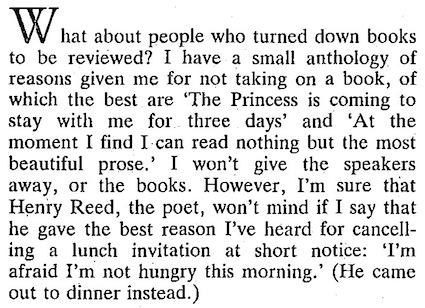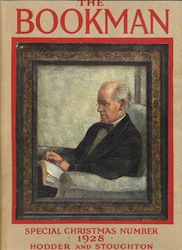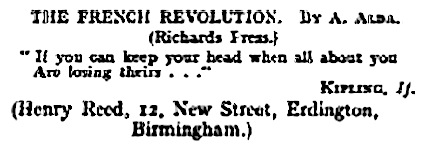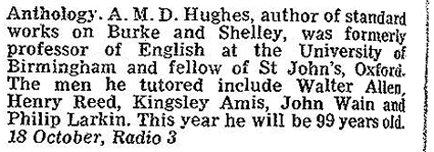|
|
Documenting the quest to track down everything written by
(and written about) the poet, translator, critic, and radio
dramatist, Henry Reed.
An obsessive, armchair attempt to assemble a comprehensive
bibliography, not just for the work of a poet, but for his
entire life.
Read " Naming of Parts."
|
Contact:
|
|
|
|
Reeding:
|
 |
I Capture the Castle: A girl and her family struggle to make ends meet in an old English castle.
|
 |
Dusty Answer: Young, privileged, earnest Judith falls in love with the family next door.
|
 |
The Heat of the Day: In wartime London, a woman finds herself caught between two men.
|
|
|
|
Elsewhere:
|
|
Posts from May 2011
|
|
|
27.4.2024
|
I've just discovered that Carcanet included Reed's underappreciated longer poem, "The Auction Sale," in a 2010 anthology of work originally published as Greville Press pamphlets: A Field of Large Desires.
Edited by Anthony Astbury, who opened the Greville Press (officially) in 1979 in the hopes that poetry in England " will happen again," the new collection is "both a treasure trove and a celebration of a remarkable venture."
The title comes from a sonnet by Fulke Greville, Lord Brook:Man's youth it is a field of large desires,
Which pleas'd within, doth all without them please;
For in this love of men live those sweet fires,
That kindle worth and kindness unto praise;
And where self-love most from her selfness gives,
Man greatest in himself, and others lives. The anthology includes pieces by Robert Bridges, Hart Crane, Elizabeth Daryush, Lawrence Durrell, Kate Ellis, David Gascoyne, W.S. Graham, Robert Graves, Ian Hamilton, John Heath-Stubbs, George Herbert, John Masefield, Edna O'Brien, Harold Pinter, Anne Ridler, Alan Ross, Martin Seymour-Smith, C.H. Sisson, Stevie Smith, and Arseny Tarkovsky, among others.
Henry Reed's "The Auction Sale" was printed as a Greville Press pamphlet in 2006.
|
1537. Radio Times, "Full Frontal Pioneer," Radio Times People, 20 April 1972, 5.
A brief article before a new production of Reed's translation of Montherlant, mentioning a possible second collection of poems.
|
While we're on the subject of Reed failing to turn up for engagements 1 2, it would seem germane to mention this famous anecdote related by Derwent May, former literary editor of the Listener (1965-1986) and the Sunday Telegraph (1986-1989):
This story gets repeated in Reed's 1986 Guardian obituary, and I had originally seen it told with Douglas Cleverdon, Reed's frequent radio producer, as the one who was stood up.
|
1536. L.E. Sissman, "Late Empire." Halcyon 1, no. 2 (Spring 1948), 54.
Sissman reviews William Jay Smith, Karl Shapiro, Richard Eberhart, Thomas Merton, Henry Reed, and Stephen Spender.
|
A quick follow-up to follow through on my previous post on 1975's fourth annual " Poems for Shakespeare" — an event overshadowed by the death of Veronica Forrest-Thomson. I managed to borrow a copy of the resulting anthology. Here's the relevant part of Anthony Rudolf's introduction:
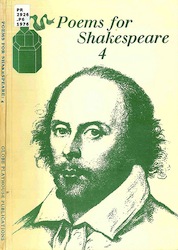 The public reading of Poems for Shakespeare (part of the Shakespeare birthday celebrations presented by Mr Samuel Wanamaker assisted by Ms Maggie Southam) took place on April 26, 1975 in the retrochoir of Southwark Cathedral. The evening began and ended with Shakespeare settings by Robert Johnson, Sibelius, Thomas Morley, and Rodney Greenberg (the world premiere of his 'Helen's Blues' with words from All's Well . . .), all sung by Helen Sava accompanied on the lute by Michael Hunt and on the guitar by Kevin Peake. This was the fourth annual Poems for Shakespeare. It is a matter for rejoicing that such an event is thinkable at this time — that it takes place is a tribute to poetry, to Shakespeare's genius and to Sam Wanamaker's vision and seriousness of purpose.
The 'commission of thy years and art' (to quote Romeo and Juliet) had involved (and I quote one variant of the letters I wrote to the poets) re-reading 'a Shakespeare play of your choice' and writing 'a poem out of that experience' (or in Sydney Carter's case a song). 'Naturally I am not asking for a direct response (unless you want that) but a poem of any kind that the re-reading inspires or suggests.' In addition to a poem, the poets were requested to select and read a passage from their chosen play — possibly a passage which connected in some way with the poem.
I received poems from ten of the twelve poets who were listed in the programme. Two — in the end — were not able to come up with poems. One of the ten poets did not turn up on the evening of the 26th. After the interval, when her turn came to read, I asked if she was present. Not receiving an answer, I asked two members of the audience (whom I had primed during the interval), the actress Elaine Ives Cameron, and the poet Christopher Hampton, to read Veronica Forrest-Thomson's poem and Shakespeare extract respectively. I was worried and at the same time irritated, and I expected some explanation or reason, within a day or two, for her absence. The next day a friend and colleague of hers and mine telephoned to ask if I knew where she was: her parents had been in the audience he told me, and now, twenty-four hours later, still didn't know her whereabouts. Three days later he wrote to me to say that Veronica had died the day before the reading. She was 28.
Tony Harrison, it would seem, was the other poet (besides Reed) who failed to produce a new poem before the event.
|
1535. Reed, Henry. "Talks to India," Men and Books. Time & Tide 25, no. 3 (15 January 1944): 54-55.
Reed's review of Talking to India, edited by George Orwell (London: Allen & Unwin, 1943).
|
Another no-show, it would seem. Reed's name turns up in a (December?) 1962 issue of the Poetry Book Society Bulletin:
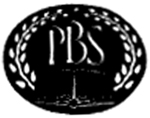 Festival of Poetry,
Festival of Poetry,
1963Arrangements are now taking shape for the Festival of Poetry to be held at the Royal Court Theatre, Sloane Square, London, SW1 from Monday to Saturday, July 15th to 20th, 1963. Patric Dickinson has been appointed Director, and a Festival Advisory Committee set up under the Chairmanship of John Lehmann.
There will be two separate programmes each evening: the first at 6.30 pm and the second at 8.40 pm. Each programme will be carefully planned to illustrate some aspect of poetry today. Special sessions will be devoted to Ballads, Poetry and Music, Dramatic Verse, American Poetry and Foreign Poetry (in translation). The Apollo Society and P.E.N. have agreed to co-operate in two of the programmes. It is intended to commission new work which will be heard for the first time during the Festival.
Among the poets and artists who it is hoped will take part are Dannie Abse, Lennox Berkeley, Clifford Dyment, Patrick Garland, Marius Goring, Ted Hughes, Penelope Lee, Elizabeth Lutyens, Ewan MacColl, I. M. Parsons, Sylvia Plath, William Plomer, Sir Michael Redgrave, Peter Redgrove, Henry Reed, Dame Flora Robson, Paul Roche, Alan Ross and Stevie Smith. A leaflet giving fuller particulars will be issued in the spring. , the souvenir booklet for the festival, however, does not include Reed as a participant, but contains poems by Patricia Beer, Alan Brownjohn, Hilary Corke, Clifford Dyment, Roy Fuller, Michael Hastings, C. Day Lewis, Christopher Logue, William Plomer, Peter Porter, Peter Redgrove, Paul Roche, Stevie Smith, and Terence Tiller, as well as an introduction by T.S. Eliot. The Poetry Book Society was founded in 1953 by Eliot and friends, to "propagate the art of poetry" (check out their online bookshop!).
Unfortunately, this is yet another episode which cements Reed's reputation as a procrastinator and perfectionist who would rather not produce anything at all, rather than share a poem he considered to be unfinished.
|
1534. Reed, Henry. "Radio Drama," Men and Books. Time & Tide 25, no. 17 (22 April 1944): 350-358 (354).
Reed's review of Louis MacNeice's Christopher Columbus: A Radio Play (London: Faber, 1944).
|
It's nice when the little things can still make you happy. The littlest of things. Thimbles. Banker's clips. Very small rocks. Or how about, let's say... the oldest citation for Henry Reed to appear in print?
The Bookman ("I am a Bookman." — James Russell Lowell) was a monthly literary magazine published in London by Hodder & Stoughton from 1891 until 1934. Essentially a catalog of their forthcoming books and publications, it also contained reviews, bibliographies, advertisements, and illustrations. Like most magazines of the time, The Bookman staged a continuous variety of writing competitions, inviting submissions on such varied subjects (some of which pertained to the issue in hand) as: "best original lyric"; "best epigram on an Income Tax Collector"; "best acrostic on the name of any author mentioned"; "best review, in not more than one hundred words, of any recently published book"; "best 14 lines of verse containing the largest number of examples from the winning list of hackneyed quotations from the competition in the previous number"; etc. Prizes for the winning entries ranged from half a guinea to up to a gift of three new books. Runners-up might be selected to appear in print.
The October, 1928 issue included the following long-running competition:
A Prize of Half a Guinea is offered for the best quotation from English verse applicable to any review or the name of any author or book appearing in this number of The Bookman.
Winners were listed the next month, in November. The entry which received the half-guinea came from one B.M. Beard of Bexleyheath, Kent, with a lyric from Ruddigore by Gilbert and Sullivan: '...blow your own trumpet, / Or, trust me, you haven't a chance!' as it applied to the book How to Secure a Good Job, by W. Leslie Ivey (London: Sir I. Pitman & Sons).
And there, among the runners-up, receiving the consolation prize of being "selected for printing," is the submission of one Henry Reed of Erdington, Birmingham, chosen for his take on the title of André Alba's The French Revolution (London: Richards Press): 'If you can keep your head when all about you / Are losing theirs...'. Reed was fourteen years old:
This tiny portrait is exciting for several reasons: Reed was barely a teenager in 1928, attending King Edward VI Grammar School in Aston, Birmingham, and yet here he is, reading and following a London literary magazine, already adept at wordplay and pun construction. He would eventually win a 1941 New Statesman competition calling for parodies of T.S. Eliot. Kipling's poem, " If—," was first published in 1910, and it quickly became (and still remains) not only Britain's favorite poem, but Britain's most-parodied poem. It must have been taught in every classroom and repeated at every recital during Reed's childhood. (See the terrific digital collection for "If—" at Dalhousie University, with images of both broadsides and multipage editions.) Finally, this is the only record I've found in print of Reed using the address of his childhood home in Erdington.
I had to look up the value of the prize, to see just how heartbroken Reed must have been when he lost the competition. Half a guinea was the equivalent of 10 s 6 d, or 55p. It would have been worth about the cost of a brand new novel.
|
1533. Friend-Periera, F.J. "Four Poets," Some Recent Books, New Review 23, no. 128 (June 1946), 482-484 [482].
A short review calls A Map of Verona more pretentious than C.C. Abbott's The Sand Castle; influenced by Eliot, Auden, MacNeice, and Day Lewis.
|
In his article, "John Clare's Learning," published in the John Clare Society Journal in 1988, Eric H. Robinson relays the following anecdote:
I remember the poet, Henry Reed, telling me of a professor at Birmingham University, where Reed studied, who told him that he must correct his grammar before he could become a poet. Reed did so: Clare not only did not do so, but after some early attempts resolutely refused to comply. [p. 11]
Henry Reed attended the University of Birmingham from 1931 until 1936. Who was this professor who taught him proper grammar and helped mould him into a modern poet? An answer appears in The Listener for September 28, 1972, in the schedule of upcoming radio programmes:
You can browse the rather daunting list of Hughes's books and publications on WorldCat. Anthony Thwaite, reviewing recent radio for The Listener on October 26, had this to say about the formidable professor's appearance:
The strangest and certainly most moving talk programme of the week was A.M.D. Hughes's Personal Anthology on Radio 3, which among other things demonstrated—in this period of celebration, when the supposed golden age of radio must often be sounding on tin ears—that old men do not forget. Hughes, approaching his 100th year ( Radio Times got this right but R.D. Smith, introducing him on the air, managed to lop off a decade), used to teach English to, among other, the young Henry Reed and Kingsley Amis. He recited out of his blindness Hardy, Milton, Wordsworth, Arnold and Shelley, with an exalted and totally unfashionable inflection that demanded complete attention. He certainly got mine. For his performance of 'The Convergence of the Twain' alone this programme deserves a place in the archives, along with those crackling atmospheric fragments of Browning and Tennyson. ["Jabbering Set," p. 560]
Incidentally, R.D. "Reggie" Smith also would have been a student of Hughes's at Birmingham, along with Reed and Walter Allen. Arthur M.D. Hughes died on January 11, 1974. His obituary appeared in The Times, the following Monday:
PROFESSOR A. M. D. HUGHES Professor Arthur Montague D'Urban Hughes, Emeritus Professor of English at Birmingham University, died on Friday at the age of 100. He was widely known for his critical book The Nascent Mind of Shelley, published when he was 74.
Hughes was born at Worthing, Sussex, on November 3, 1873, the son of the Rev Edwin M. M. Hughes. He was educated at St Edmund's School, Canterbury, and St John's College, Oxford, and became a lecturer for Oxford's Extension Delegacy. He was English Lektor at Kiel University 1905-14 and a member of the staff of Oxford University Press 1915-21.
He was a lecturer in English at Birmingham from 1921 to 1931; and he lectured at St John's College, Oxford, from 1923 to 1929. He was appointed Reader in English at Birmingham in 1931 and Professor of English Language and Literature in 1935, retiring in 1939. He was made emeritus professor in 1940.
He married in 1906 Wilhemina Langenheim, of Kiel, Germany, and they had a daughter.[January 14, 1974, p. 14]
Eric Robinson also mentions Reed in his acceptance speech for the Leonardo da Vinci Medal, given at the awards banquet of the annual meeting of the Society for the History of Technology in Las Vegas, in 2006:
I began my life of archival research in the Birmingham City Reference Library at the age of eleven, when I went there in the evenings to do my homework. A happy, rotund lady called Miss Norris used to help me by bringing me books, but also manuscripts from the Boulton and Watt Collection. As a junior librarian (aged sixteen), she herself had compiled the first catalog of that great archive, and it was amazing what she could find in it. It's one thing to read about James Watt's engines, and another to look at the splendid colored drawings that Watt submitted in order to get a patent. A few years later, I was being taught at King Edward VI Grammar School in Aston, Birmingham, by the poet Henry Reed. He introduced me to the poetry of Auden. I read for the first time poetry whose visual images reinforced my own daily experiences...[.] [Technology and Culture 48, no. 1 (2007): 133]
And so the circle of teaching is complete!
|
1532. Vallette, Jacques. "Grand-Bretagne," Mercure de France, no. 1001 (1 January 1947): 157-158.
A contemporary French language review of Reed's A Map of Verona.
|
|
|
|
1st lesson:
Reed, Henry
(1914-1986). Born: Birmingham, England, 22 February 1914; died: London, 8
December 1986.
Education: MA, University of Birmingham, 1936. Served: RAOC, 1941-42; Foreign Office, Bletchley Park, 1942-1945.
Freelance writer: BBC Features Department, 1945-1980.
Author of:
A Map of Verona: Poems (1946)
The Novel Since 1939 (1946)
Moby Dick: A Play for Radio from Herman Melville's Novel (1947)
Lessons of the War (1970)
Hilda Tablet and Others: Four Pieces for Radio (1971)
The Streets of Pompeii and Other Plays for Radio (1971)
Collected Poems (1991, 2007)
The Auction Sale (2006)
|
Search:
|
|
|
Recent tags:
|
Posts of note:
|
Archives:
|
Marginalia:
|
|








